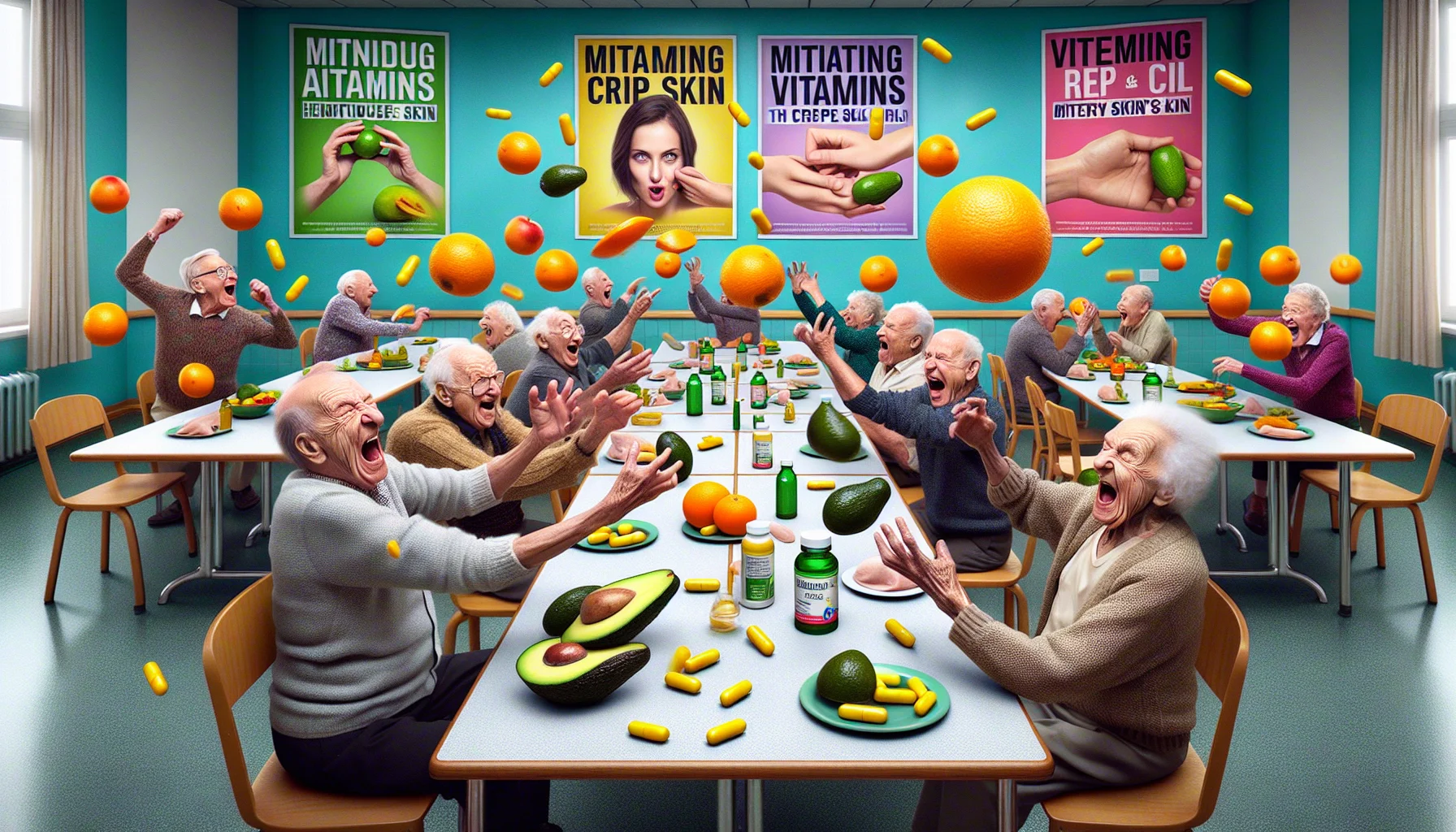What vitamins help with crepey skin Quiz
Test Your Knowledge
Question of
Understanding Crepey Skin
Causes of Crepey Skin
- Age-Related Changes
- Environmental Factors
Symptoms and Identification
- Texture and Appearance
- Common Affected Areas
Prevention Strategies
- Sun Protection
- Regular Moisturization
Essential Vitamins for Skin Health
Vitamin A and Skin Elasticity
- Role in Collagen Production
- Natural Food Sources
Vitamin C as an Antioxidant
- Protection Against Free Radical Damage
- Citrus Fruits and Vegetables
Vitamin E for Skin Barrier Repair
- Enhancing Skin's UV Defense
- Nuts and Seeds
Nutritional Diets for Healthy Skin
-
Anti-Aging Foods
- Omega-3 Rich Fish
- Leafy Greens and Antioxidants
-
Hydration and Skin Texture
- Importance of Water Intake
- Foods with High Water Content
-
Balanced Diet for Skin Repair
- Protein-Rich Foods for Collagen Synthesis
- Complex Carbohydrates and Skin Health
Supplements to Support Skin Structure
Collagen Boosting Supplements
Hydrolyzed Collagen
Hydrolyzed collagen is a form of collagen that is broken down into smaller, easily digestible particles. It helps in enhancing the skin's elasticity and firmness by promoting the production of new collagen fibers in the skin.
Amino Acids and Their Role
Amino acids are the building blocks of proteins, including collagen. Supplementing with specific amino acids can support the body’s natural collagen production, contributing to healthier and more resilient skin.
Hyaluronic Acid for Hydration
Benefits for Skin Plumpness
Hyaluronic acid is known for its incredible ability to retain moisture. It can hold up to 1000 times its weight in water, significantly contributing to the skin's hydration, plumpness, and softness.
Combining with Vitamins for Enhanced Effect
When combined with vitamins such as Vitamin C, the effectiveness of hyaluronic acid is enhanced, promoting better absorption and further boosting skin hydration and elasticity.
Coenzyme Q10 and Skin Aging
Energy Production in Skin Cells
Coenzyme Q10 plays a crucial role in the production of energy within skin cells. It helps to rejuvenate and revitalize skin, reducing the appearance of fine lines and wrinkles.
Synergy with Other Nutrients
The benefits of Coenzyme Q10 can be amplified when used in conjunction with other nutrients. This synergy can lead to improved skin texture and a reduction in the signs of aging.
Topical Treatments and Skincare Routines
-
Retinol Creams and Serums
- Application Techniques : For optimal results, apply retinol creams or serums at night on clean, dry skin. Start with a pea-sized amount, spreading it evenly across the face, avoiding the eye area. Use retinol sparingly at first, gradually increasing frequency as your skin adapts.
- Pairing with Moisturizers : After applying retinol, wait for it to fully absorb before applying a moisturizer. This can help mitigate potential dryness or irritation from retinol, especially for sensitive skin types. Consider using a moisturizer that complements your skin’s needs, such as those with hyaluronic acid for hydration.
-
Alpha Hydroxy Acids (AHAs)
- Exfoliation Benefits : AHAs are effective exfoliants that help remove dead skin cells, revealing smoother, brighter skin underneath. Regular use can improve skin texture, reduce the appearance of fine lines, and enhance skin hydration.
- Choosing the Right Concentration : Start with lower concentrations of AHAs to see how your skin reacts, gradually working your way up. For sensitive skin, a lower concentration is advisable to reduce the risk of irritation.
-
Peptide-Enriched Products
- Mechanism of Action on Crepey Skin : Peptides in skincare products can signal your skin to produce more collagen, helping to reduce the appearance of crepey skin. They support skin firmness, elasticity, and can diminish the look of fine lines and wrinkles.
- Integrating into Daily Skincare : Incorporate peptide-enriched products into your daily skincare routine for the best results. Apply after cleansing but before moisturizing to help aid absorption. Consistent use is key to seeing improvements in skin texture and firmness.
Lifestyle Changes for Skin Rejuvenation
Importance of Sleep in Skin Repair
Sleep Cycles and Hormone Regulation: Adequate sleep is crucial for the regulation of hormones that repair and rejuvenate the skin. During sleep, the body increases blood flow to the skin, which aids in collagen production and damage repair resulting from UV exposure.
Tips for a Restful Night's Sleep: Maintaining a consistent sleep schedule, creating a comfortable sleeping environment, and avoiding screens before bedtime can significantly improve sleep quality, thereby aiding in skin rejuvenation.
Stress Management Techniques
Impact of Stress on Skin Health: Chronic stress can lead to skin issues such as acne, eczema, and psoriasis. Stress induces the production of cortisol, which can decrease the skin's ability to retain moisture and heal.
Relaxation Practices for Better Skin: Incorporating relaxation techniques such as deep breathing, yoga, and meditation into your daily routine can help manage stress levels, promoting healthier skin.
Regular Exercise and Skin Tone
Improved Blood Circulation Effects: Regular exercise enhances blood circulation, which is beneficial for the skin. Increased blood flow delivers more oxygen and nutrients to the skin, promoting cell repair and vitality.
Types of Exercise Beneficial for Skin: Cardiovascular exercises, such as running, cycling, and swimming, are particularly effective in boosting blood circulation. However, any form of exercise that increases heart rate can contribute to a healthier skin tone.












